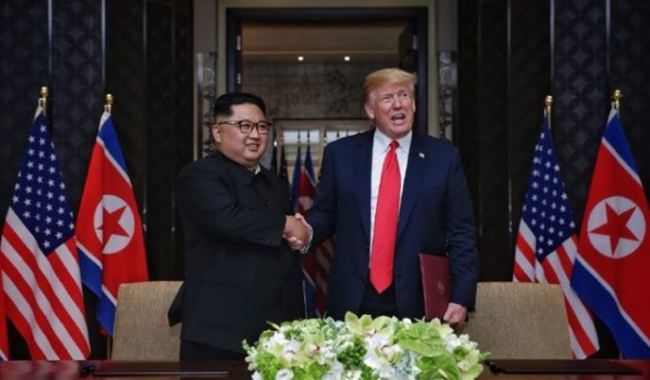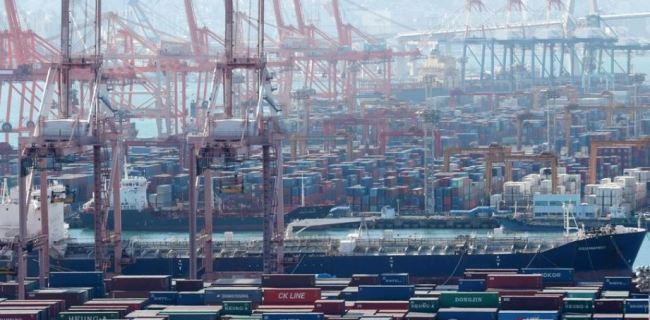2019, a year of challenges and uncertainties for Korea
By Choi He-sukPublished : Dec. 31, 2018 - 16:54
For South Korea, 2019 is likely to be a year full of difficult tasks, involving issues ranging from diplomacy and North Korea to economic, social and political matters.
The goals of achieving denuclearization in North Korea and peace on the Korean Peninsula also face critical events in the coming months.
The most critical will be the second US-North Korea summit.
The goals of achieving denuclearization in North Korea and peace on the Korean Peninsula also face critical events in the coming months.
The most critical will be the second US-North Korea summit.

US President Donald Trump has stated a number of times that he plans to meet North Korean leader Kim Jong-un for a second time early in the year, but the date of the meeting remains undetermined.
In addition, working-level talks between the two countries failed to produce significant results last year. Hinting at serious discontent in Washington, US national security adviser John Bolton has stated that a second meeting between Trump and Kim is necessary due to Pyongyang’s failure to deliver on the promises made at the first summit.
The slow progress of US-North Korea talks has also delayed Kim’s planned visit to Seoul. President Moon Jae-in and Kim had agreed that the North Korean leader would visit Seoul in 2018, unless unforeseen circumstances arose to prevent it.
Despite the agreement, Kim did not make the trip and Seoul’s presidential office has left the date open -- saying that the timing is less important than the progress achieved when the visit happens.
On the foreign relations front, Seoul is faced with the difficult task of improving relations with Tokyo.
Seoul-Tokyo relations rapidly deteriorated in the second half of last year. Ties between the two countries were shaken following Seoul’s decision to dissolve the “comfort women” foundation for survivors of wartime sexual slavery, funded with a donation from Japan. Relations deteriorated further following a Korean Supreme Court ruling in favor of Koreans seeking compensation from Japanese companies that had subjected them to forced labor during Japan’s occupation of Korea.
Meanwhile, analysts project that the country’s economy will continue to be buffeted by the same downside risks that weighed on it in 2018.

While Korea’s export-dependent economy faces challenges from the outside -- for example, US rate hikes and ongoing US-China trade tension -- domestic brawls over employment policies and the statutory minimum wage hike will add to the uncertainty, according to local think tanks and global observers.
Nomura Financial Investment cut its economic forecast for Korea for 2019 to 2.5 percent from the previous 2.7 percent, citing restructuring in key industries and the labor market as obstacles.
The Bank of Korea put the yearly growth outlook for 2019 at 2.7 percent, and the state-run Korea Development Institute’s estimate was 2.6 percent.
But a sense of skepticism lingered in the market that the central bank and the government might lower their projections down the line, reflecting the slowing global economy and the US rate hike timeline.
“Global growth and trade may take a downturn, in case developed economies decelerate at a faster pace than expected or emerging economies fail to respond to the US rate hike,” the KDI added in its report, leaving room for further downward adjustment.
Local private think tanks also agreed that the country’s economy would face bigger challenges in 2019 than in 2018.
Citing the downturn in the global economy, LG Economic Research Institute predicted that exports and infrastructure investment would slow down along with the growth momentum of the country’s forte semiconductor sector. Hyundai Research Institute suggested that construction infrastructure investment would begin a downtrend during the first half of 2019.
In the face of these pessimistic views, the Moon Jae-in administration in December decided on a 9.7 percent budget increase dedicated to “inclusive growth” initiatives such as job creation and support of low-income clusters, but its uncompromising stance on the pace of wage hikes will continue to create social conflict in the labor market, observers said.
Seoul’s hourly minimum wage for 2019 is set at 8,350 won ($7.48), up 10.9 percent from 7,530 won in 2018. The new amount marks a 29.1 percent rise since the progressive Moon took office in 2017.
Responding to market complaints, especially from employers, the Ministry of Economy and Finance suggested that they would take action to mitigate the impact of the changes.
“The government will input 9 trillion won into the market in order to support the market amid wage hike impacts,” said new Deputy Prime Minister and Finance Minister Hong Nam-ki.
Nevertheless, Hong continued to advocate the government’s wage hike plan, leaving room for continued disputes on the subject throughout the new year.
The country’s political arena is also likely to reel from issues that began in 2018.
Moon, who early on in his term was the most popular democratically elected president in Korean history, closed last year with approval ratings that had reached a new low.
According to a Gallup Korea poll, Moon’s approval rating fell to 46 percent in the final week of December. In comparison, the figure at the end of 2017 stood at 72 percent.
While Moon’s ratings dip, the main opposition Liberty Korea Party seems unlikely to let the controversy surrounding Kim Tae-woo slide.
The former inspector with Cheong Wa Dae’s special inspections team, currently under investigation on suspicion of leaking official information, has raised one accusation after another. In response, the Liberty Korea Party has launched a committee to delve into the matter and filed criminal complaints against top Moon aides.
Kim says he was removed from Cheong Wa Dae for gathering intelligence on ruling bloc figures, and that he carried out surveillance of civilians while working on the presidential office’s special inspection team.
Cheong Wa Dae denies the allegations, but the main opposition party accuses the Moon administration of illegal surveillance of civilians, an offense for which Moon and the ruling Democratic Party had taken action against the Lee Myung-bak and Park Geun-hye administrations.
By Choi He-suk (cheesuk@heraldcorp.com) and Bae Hyun-jung (tellme@heraldcorp.com)








![[Kim Seong-kon] Democracy and the future of South Korea](http://res.heraldm.com/phpwas/restmb_idxmake.php?idx=644&simg=/content/image/2024/04/16/20240416050802_0.jpg&u=)








![[KH Explains] Hyundai's full hybrid edge to pay off amid slow transition to pure EVs](http://res.heraldm.com/phpwas/restmb_idxmake.php?idx=652&simg=/content/image/2024/04/18/20240418050645_0.jpg&u=20240418181020)

![[Today’s K-pop] Zico drops snippet of collaboration with Jennie](http://res.heraldm.com/phpwas/restmb_idxmake.php?idx=642&simg=/content/image/2024/04/18/20240418050702_0.jpg&u=)